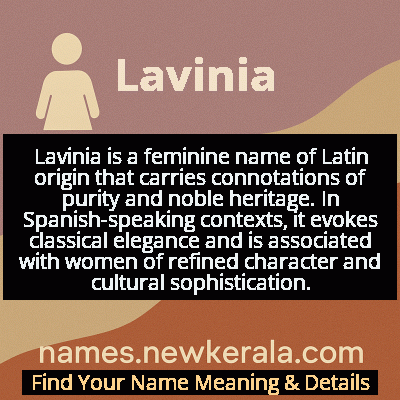Lavinia Name Meaning & Details
Origin, Popularity, Numerology Analysis & Name Meaning of Lavinia
Discover the origin, meaning, and cultural significance of the name LAVINIA. Delve into its historical roots and explore the lasting impact it has had on communities and traditions.
Name
Lavinia
Gender
Female
Origin
Spanish
Lucky Number
5
Meaning of the Name - Lavinia
Lavinia is a feminine name of Latin origin that carries connotations of purity and noble heritage. In Spanish-speaking contexts, it evokes classical elegance and is associated with women of refined character and cultural sophistication.
Lavinia - Complete Numerology Analysis
Your Numerology Number
Based on Pythagorean Numerology System
Ruling Planet
Mercury
Positive Nature
Adventurous, dynamic, curious, and social.
Negative Traits
Restless, impatient, inconsistent, prone to indulgence.
Lucky Colours
Green, white.
Lucky Days
Wednesday.
Lucky Stones
Emerald.
Harmony Numbers
1, 3, 9.
Best Suited Professions
Sales, marketing, travel, entertainment.
What People Like About You
Versatility, charisma, adventurous spirit.
Famous People Named Lavinia
Lavinia Fontana
Painter
First professional female artist in Western Europe
Lavinia Warren
Entertainer
Famous performer with P.T. Barnum's circus
Lavinia Miloșovici
Gymnast
Romanian Olympic champion with multiple gold medals
Lavinia Greenlaw
Poet and Novelist
Award-winning British poet and author
Name Variations & International Equivalents
Click on blue names to explore their detailed meanings. Gray names with will be available soon.
Cultural & Historical Significance
In Spanish and broader Hispanic culture, Lavinia maintains its classical elegance while being embraced within local naming traditions. The name is often chosen by families who value historical depth and literary connections, particularly those with interests in classical education or aristocratic heritage. Throughout history, the name has appeared in various artistic works, from Shakespeare's Titus Andronicus to modern literature, each time reinforcing its associations with feminine strength, cultural tradition, and refined character. The enduring appeal of Lavinia across cultures demonstrates how classical names can transcend their original contexts while retaining their essential symbolic power.
Extended Personality Analysis
Women named Lavinia are typically associated with elegance, intelligence, and a natural grace that reflects the name's classical origins. They often possess a thoughtful, introspective nature combined with strong cultural awareness and appreciation for tradition. Lavinias tend to be well-spoken individuals who value education and intellectual pursuits, frequently displaying interests in literature, history, or the arts. Their personality combines quiet confidence with empathetic understanding, making them both respected leaders and compassionate friends.
In social settings, Lavinias often exhibit refined manners and diplomatic skills that allow them to navigate complex situations with poise. They are typically perceived as having strong moral character and integrity, traits that align with the name's historical associations with purity and nobility. While they may appear reserved initially, Lavinias usually form deep, lasting relationships based on mutual respect and intellectual connection. Their strength often manifests as quiet resilience rather than overt assertiveness, and they tend to approach challenges with careful consideration and strategic thinking. The combination of cultural sophistication and inner strength makes Lavinias particularly effective in roles requiring both creativity and practical problem-solving.
Modern Usage & Popularity
In contemporary naming practices, Lavinia has experienced a notable revival as part of the broader trend toward vintage and classical names. While it remains relatively uncommon compared to popular choices, it maintains steady usage particularly among educated families and those with interests in literature, history, or the arts. In Spanish-speaking countries and Hispanic communities, Lavinia is appreciated for its elegant sound and classical heritage, often chosen by parents seeking a name that is both traditional and distinctive. The name's popularity has shown gradual increase in recent decades, reflecting growing interest in names with historical depth and cultural significance. It's particularly favored by parents who want a feminine name that conveys sophistication without being overly common, striking a balance between uniqueness and familiarity.
Symbolic & Spiritual Meanings
Lavinia carries rich symbolic meanings derived from its mythological origins and historical usage. Primarily, it symbolizes purity and nobility, reflecting the character's role in Roman foundation myths as a figure of virtue and royal lineage. The name also represents cultural synthesis and destiny, as the mythological Lavinia's marriage united different peoples to create a new civilization. Symbolically, it embodies feminine strength that is both graceful and resilient, suggesting a woman who maintains her dignity and purpose through challenges. The name connects to themes of historical continuity and tradition, representing how personal identity is intertwined with cultural heritage. In modern interpretation, Lavinia often symbolizes intellectual depth combined with emotional intelligence, reflecting the balance between classical education and contemporary awareness that the name suggests.

